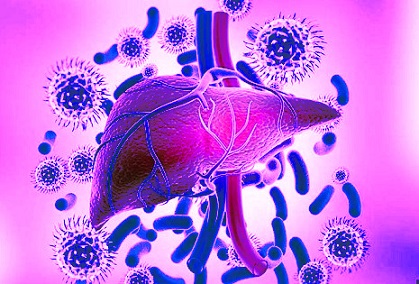Nikhil Prasad Fact checked by:Thailand Medical News Team Jul 06, 2024 9 months, 1 week, 5 days, 8 hours, 16 minutes ago
COVID-19-News: The COVID-19 pandemic, caused by the highly infectious SARS-CoV-2 virus, has primarily been associated with respiratory issues, but its impact on other organs, including the liver, is becoming increasingly evident. Research from Universidad Panamericana School of Medicine in Mexico, the University of Colorado Anschutz Medical Campus, and the Universidad Nacional Autónoma de México that is covered in this
COVID-19 News report, sheds light on how this virus affects the liver, potentially leading to long-term health complications.
 New Study Findings Reveal Long-Term Risks Of Liver Issues From COVID-19
COVID-19 and the Liver: An Overview
New Study Findings Reveal Long-Term Risks Of Liver Issues From COVID-19
COVID-19 and the Liver: An Overview
While the lungs are the primary target of SARS-CoV-2, the virus can also cause significant damage to other organs, including the liver. Patients with COVID-19 often show signs of liver injury, indicated by abnormal levels of liver enzymes in blood tests. However, understanding the exact cause of this damage has been challenging. Researchers have proposed several mechanisms, including direct viral attack, inflammation, drug-induced liver injury, and reduced oxygen supply to the liver.
Mechanisms of Viral Entry
SARS-CoV-2 enters liver cells through a specific receptor called ACE2, which is highly expressed in cholangiocytes (bile duct cells) and other liver cells. This receptor helps the virus attach and enter the cells, leading to infection. In addition to ACE2, other proteins, such as TMPRSS2, facilitate viral entry, making the liver a prime target for the virus.
In Vitro Evidence
In vitro studies, which involve experiments conducted outside a living organism, have shown that SARS-CoV-2 can infect various liver cells, including cholangiocytes and hepatocytes (liver cells). These studies confirmed the presence of viral RNA and proteins in infected cells, leading to cell damage and death.
Histopathological Changes in the Liver
Histopathology involves studying tissues under a microscope to identify disease. Researchers focused on liver biopsies, autopsies, and in vitro liver analyses to understand how COVID-19 affects the liver at a cellular level. They found evidence of direct viral presence in liver cells, which leads to various cellular changes, such as mitochondrial swelling, endoplasmic reticulum dilation, and cell death (apoptosis).
Case Studies and Clinical Observations
Several case studies have documented severe liver injury in COVID-19 patients. For instance, a one case reported involved a patient who developed acute liver failure and required urgent liver transplantation. The presence of SARS-CoV-2 RNA in liver cells confirmed direct viral damage.
Inflammation and Liver Injury
One of the significant findings was the inflammation within the liver tissue. Inflammation was often accompanied by necrosis (death of liver cells), steatosis (fat accumulation in the liver), cholestasis (impaired bile flow), and lobular inflammation (widespread l
iver inflammation). These conditions indicate that COVID-19 can cause severe and diverse liver damage.
Long-Term Complications:
Sclerosing Cholangitis
One of the severe long-term complications identified is COVID-19-related secondary sclerosing cholangitis (SSC). This condition involves chronic inflammation and scarring of the bile ducts, leading to liver damage. SSC has been observed in patients who had severe COVID-19 and required intensive care, particularly those on invasive mechanical ventilation.
Vascular Thrombosis and Endothelial Inflammation
COVID-19 also impacts the liver's blood vessels, leading to conditions like vascular thrombosis (blood clots in the vessels) and endothelial inflammation (inflammation of the vessel lining). These changes can exacerbate liver damage and contribute to overall organ dysfunction.
Inflammation and Immune Response
COVID-19 triggers an overactive immune response, often referred to as a "cytokine storm," which can further damage the liver. The liver is a crucial organ for immune function, housing many immune cells that respond to infection. This immune response can lead to significant inflammation and liver injury.
Fibrosis and Long-Term Damage
Liver fibrosis, the formation of scar tissue in the liver, has been observed in COVID-19 patients. While fibrosis can result from various conditions, its presence in COVID-19 patients suggests long-term liver damage. Most cases of fibrosis were mild, but they indicate the potential for chronic liver issues following COVID-19 infection.
Steatosis and Metabolic Changes
Liver steatosis, characterized by fat accumulation in liver cells, was commonly observed in COVID-19 patients. This condition can range from mild to severe and may be influenced by inflammation and metabolic changes caused by the virus. Steatosis is often seen in patients with other risk factors, such as obesity and metabolic syndrome.
Autoimmune Hepatitis
COVID-19 can trigger autoimmune responses in some individuals, leading to conditions like autoimmune hepatitis. This condition occurs when the immune system attacks the liver, causing inflammation and damage. Cases of autoimmune hepatitis have been reported following COVID-19 infection and vaccination, highlighting the need for careful monitoring.
Conclusion
The comprehensive research on COVID-19's impact on the liver underscores the virus's ability to cause significant and long-term liver damage. Understanding the mechanisms of liver injury and the potential for chronic complications is crucial for developing effective treatments and improving patient outcomes. As the pandemic continues, ongoing research will be essential in mitigating the long-term health impacts of COVID-19.
The study findings were published in the journal: World of Gastroenterology.
https://www.wjgnet.com/1007-9327/full/v30/i22/2866.htm
For the latest
COVID-19 News, keep on logging to Thailand Medical News.
Read Also:
https://www.thailandmedical.news/news/breaking-international-study-warns-that-pfizer-s-mrna-vaccines-could-be-causing-a-silent-pandemic-of-liver-injury
https://www.thailandmedical.news/news/covid-19-news-scientists-unveil-molecular-mechanisms-underlying-sars-cov-2-hepatotropism-and-liver-damage
